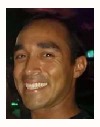 ROBERT DAVID ROJAS, warrior into humanitarian
ROBERT DAVID ROJAS, warrior into humanitarian
“Since the inception of a communal society where individuals gathered for support and sustainability, we have all yearned for a world where disputes can be resolved.” —Robert Rojas
Robert Rojas knows for certain that a drastic shift in conflict resolution is possible. In 2004, his Marine battalion fought in operation Iraqi Freedom. Anger over 9-11 still caused many military personnel to dismiss learning about Arabic culture. Constantly embattled, they failed to distinguish between destroying the enemy and disrespecting or destroying their culture. For infantry Marines like Robert, this mindset further led to a breakdown in the connection between the people they were supposed to be protecting. “I personally don’t blame them…considering the way they were treated,” Robert says. Still nineteen at the end of his first deployment, he’d already begun to understand that despite the need to combat terrorism, our troops had exacerbated the problems with no clear solution in sight.
During his second deployment in 2006, however, he saw a major shift. Along with every Marine platoon, a platoon of Iraqi Army soldiers conducted joint patrols, raids, and posts. Americans gained enormous insight into Arabic culture and perspective, truly connecting with the local populace. “We conducted a local census, held town meetings with village elders who voiced their concerns, and cemented friendships with people in the city who had once sided with the insurgents,” Robert says. Former enemy sympathizers disclosed the location of IEDs (improvised explosive devices) and weapon caches. The combination of local intelligence and constant security patrols enabled US forces to secure the city and garner trust between the American and Iraqi people, turning the tide of the conflict. Military leadership had become culturally literate, and it made a vast difference.
Robert ended his military service in 2008 and attended college, but deep down, he was troubled. “I couldn’t stop feeling that my service in Iraq had led to heartbreak and destruction.” So many innocent civilians have suffered, and far more humanitarian aid was needed. “We joined [the military] to make a difference in the world, to help others in danger and defend our nation by eliminating foreign threats.” Robert feels he’s always had the heart of a humanitarian.
In 2011, he was one of 2000 applicants selected as a Cultural Ambassador and Language Assistant for the Ministry of Education of Spain. For two years, Robert lived in both the northern and southern regions in A Coruña and Seville where he taught English, history, mathematics, and even energy efficiency certification. He assisted Spanish faculty members with translations, careful to integrate material within the context of Spanish culture.
Robert sees communities based on intercultural competence as essential to understanding issues and conflicts and building international cooperation. This would require complete immersion via language, customs, interactions, festivals, food, and daily life.
While in Spain, he utilized a website called Couchsurfing to connect with travelers who needed a place to stay and a host to show them the city. When he traveled, he stayed with a participating host. In this way he met people from Poland, Russia, Italy, Austria, Germany, France, England, Australia, Denmark, and the USA. More than free lodging and traditional home cooking, travelers discovered the real heart and soul of a city and its culture, “an experience not to be found from staying in a hotel,” Robert says.
Hitchhiking from the Czech Republic to Florence, Italy fully tested his adaptive abilities on the high mountain passes and along the crystal blue lakes of Austria and Italy. Blending into the ever-changing cultural landscapes, he met people willing to help with no thoughts of compensation—“Some of the nicest people,” Robert says, marveling at “this feeling of trust and connection with a group of people you just met. But I guess that’s what people mean when they say we are all spiritually connected somehow.”
His current project involves working with four engineers in the Darien Region of Colombia to help people collect rain water in 150-gallon drums during the rainy season to last them into the dry season when lack of water creates diseases. Agua Pura has partners but the labor is all volunteer. Robert hopes to keep working in the field of humanitarianism.
